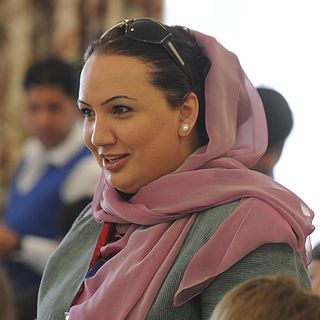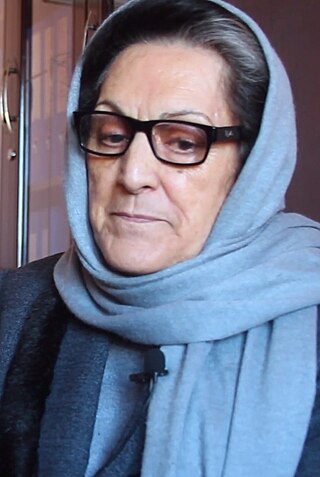Related Research Articles

The Revolutionary Association of the Women of Afghanistan (RAWA) is a women's organization based in Kabul, Afghanistan, that promotes women's rights and secular democracy. It was founded in 1977 by Meena Keshwar Kamal, an Afghan student activist who was assassinated in February 1987 for her political activities. The group, which supports non-violent strategies, had its initial office in Kabul, Afghanistan, but then moved to Pakistan in the early 1980s.

The treatment of women by the Taliban refers to actions and policies by various Taliban regimes which are either specific or highly commented upon, mostly due to discrimination, since they first took control in 1996. During their first rule of Afghanistan (1996–2001), the Taliban were notorious internationally for their misogyny and violence against women. In 1996, women were mandated to wear the burqa at all times in public. In a systematic segregation sometimes referred to as gender apartheid, women were not allowed to work, nor were they allowed to be educated after the age of eight. Women seeking an education were forced to attend underground schools, where they and their teachers risked execution if caught. They were not allowed to be treated by male doctors unless accompanied by a male chaperone, which led to illnesses remaining untreated. They faced public flogging and execution for violations of the Taliban's laws.

Dr. Massouda Jalal is the first woman in the history of Afghanistan who ran for the Office of the President of Afghanistan in 2002, and again in 2004. She holds the distinction of being the first woman to compete for presidency in Afghanistan, a highly conservative society where women's engagement in public life was considered improper, unacceptable, and previously banned. Dr. Jalal emerged as a leading voice of Afghan women in 2001 after her election as the Representative to the 2002 Loya Jirga. While serving her term, she became one of the frontrunners for the position of Interim President, opposite to ex-president Hamid Karzai.

Meena Keshwar Kamal, commonly known as Meena, was an Afghan revolutionary political activist, women's rights activist and founder of Revolutionary Association of the Women of Afghanistan (RAWA), who was assassinated in 1987.
Phyllis Chesler is an American writer, psychotherapist, and professor emerita of psychology and women's studies at the College of Staten Island (CUNY). She is a renowned second-wave feminist psychologist and the author of 18 books, including the best-sellers Women and Madness (1972), With Child: A Diary of Motherhood (1979), and An American Bride in Kabul: A Memoir (2013). Chesler has written extensively about topics such as gender, mental illness, divorce and child custody, surrogacy, second-wave feminism, pornography, prostitution, incest, and violence against women.
Human rights in Afghanistan are severely restricted, especially since Taliban's takeover of Kabul in August 2021. Women's rights and freedom are severely restricted as they are banned from most public spaces and employment. Afghanistan is the only country in the world to ban education for women over the age of eleven. Taliban's policies towards women are usually termed as gender apartheid. Minority groups such as Hazaras face persecution and eviction from their lands. Authorities have used physical violence, raids, arbitrary arrests and detention, torture, enforced disappearances of activists and political opponents.

Malalai Joya is an activist, writer, and a politician from Afghanistan. She served as a Parliamentarian in the National Assembly of Afghanistan from 2005 until early 2007, after being dismissed for publicly denouncing the presence of warlords and war criminals in the Afghan Parliament. She was an outspoken critic of the Karzai administration and its western supporters, particularly the United States.

Women's rights in Afghanistan have oscillated back and forth depending on the time period as well as the regime in power. After King Amanullah Khan's attempts to modernize the country in the 1920s, women officially gained equality under the 1964 Constitution. However, these rights were taken away in the 1990s through different temporary rulers such as the mujahideen and the Taliban during the Afghan civil war. During the first Taliban regime (1996–2001), women had very little to no freedom, specifically in terms of civil liberties. When the Taliban was overthrown by the United States following the 9/11 attacks, women's rights gradually improved under the presidential Islamic Republic of Afghanistan. Women were de jure equal to men under the 2004 Constitution.

Shukria Barakzai is an Afghan politician, journalist and Muslim feminist. She was the ambassador of Afghanistan to Norway. She is a recipient of the International Editor of the Year Award.
Hamida Barmaki was a renowned Afghan law professor and human rights activist. She was killed together with her family in a suicide attack.

Leena Alam is an Afghan film, television, and theater actress. She has appeared in films such as Kabuli Kid, Black Kite, Loori, A Letter to the President and Hassan. She is widely known to have worked on film and TV that speak of child marriage, gender inequality, women's rights and social conflicts.

Fawzia Koofi is an Afghan politician, writer, and women's rights activist. Originally from Badakhshan province, Koofi was recently a member of the Afghan delegation negotiating peace with the Taliban in Doha Qatar. She is an ex Member of Parliament in Kabul and was the Vice President of the National Assembly.
Anarkali Kaur Honaryar is a Sikh Afghan politician. She is also a women's rights activist and a dentist, as well as a medical doctor.
Rape is a major issue in Afghanistan. A number of human rights organizations have criticized the country's rape laws and their enforcement.

Farkhunda Zahra Naderi is an Afghan politician and women's right activist. She is a member of the Afghanistan's High Council for National Reconciliation (HCNR) chaired by Abdullah Abdullah. Previously she served as a senior advisor to president Ashraf Ghani in United Nations Affairs. Before that she served as a member of Parliament, where she was elected as an MP in the 2010 Afghan Parliamentary Election.

Farkhunda Malikzada, commonly referred to as Farkhunda, was a 27-year-old woman who was publicly lynched by a mob in Kabul, the capital of Afghanistan, on 19 March 2015. A large crowd formed in the streets around her claiming that she had burned the Quran, and for that, her accusers announced that she must be sent to Hell right away.

Shafiqa Habibi is a journalist, television anchor, activist and politician from Afghanistan. She is known for her work to support women journalists, and for her 2004 candidacy for Vice President of Afghanistan as the running mate of Abdul Rashid Dostum.

Roya Rahmani is an Afghan diplomat who served as Afghanistan's first female ambassador to the United States and non-resident ambassador to Mexico, Argentina, Colombia, and the Dominican Republic from December 2018 to July 2021. She is currently the Chair of the international advisory company in development finance — Delphos International LTD. She is also a distinguished fellow at the Georgetown Institute for Women, Peace, and Security, a senior advisor at the Atlantic Council's South Asia Center, and a senior fellow for international security at the New America Foundation. From 2016 to 2018, she served as Afghanistan's first female ambassador to Indonesia, first ever ambassador to the Association of Southeast Asian Nations, and non-resident ambassador to Singapore.
Protests in Afghanistan against the Taliban started on 17 August 2021 following the Fall of Kabul to the Taliban. These protests are held by Islamic democrats and feminists. Both groups are against the treatment of women by the Taliban government, considering it as discriminatory and misogynistic. Supported by the National Resistance Front of Afghanistan, the protesters also demand decentralization, multiculturalism, social justice, work, education, and food. There have been pro-Taliban counterprotests.
Tamana Zaryab Paryani is an Afghan journalist and women right's activist known for her protests against Taliban rule in Afghanistan. She is widely recognised as a symbol of the women's struggle in Afghanistan. In December 2022, Tamana was named as one of BBC's 100 Women. She is a member of an Afghan women's rights activist group called Seekers of Justice. She presently lives in Germany after fleeing from Afghanistan in August 2022.
References
- 1 2 3 4 5 6 MacKenzie, Jean. "It's a slow revolution for Afghanistan's women". Afghan Women News. Archived from the original on 6 April 2016. Retrieved 29 March 2016.
- ↑ "Lawlessness and religious extremism leave Afghan women under constant threat of violence". New York Times. 9 July 2015. Retrieved 29 March 2016.[ permanent dead link ]
- 1 2 3 4 5 6 Latifi, Ali M. (7 April 2015). "Afghanistan failing to protect women's rights activists, report says". Los Angeles Times. Retrieved 29 March 2016.
- ↑ "Humira Saqib". British and Irish Agencies Afghanistan Group. Retrieved 29 March 2016.
- 1 2 3 4 Akbar, Noorjahan (13 October 2015). "Afghan activists live unconventional lives". American University School of Communication. Archived from the original on 26 March 2016. Retrieved 29 March 2016.